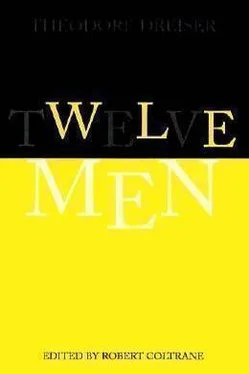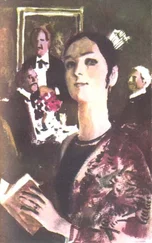Теодор Драйзер - Twelve Men
Здесь есть возможность читать онлайн «Теодор Драйзер - Twelve Men» весь текст электронной книги совершенно бесплатно (целиком полную версию без сокращений). В некоторых случаях можно слушать аудио, скачать через торрент в формате fb2 и присутствует краткое содержание. Год выпуска: 2014, Издательство: epubBooks Classics, Жанр: Биографии и Мемуары, на английском языке. Описание произведения, (предисловие) а так же отзывы посетителей доступны на портале библиотеки ЛибКат.
- Название:Twelve Men
- Автор:
- Издательство:epubBooks Classics
- Жанр:
- Год:2014
- ISBN:нет данных
- Рейтинг книги:4 / 5. Голосов: 1
-
Избранное:Добавить в избранное
- Отзывы:
-
Ваша оценка:
- 80
- 1
- 2
- 3
- 4
- 5
Twelve Men: краткое содержание, описание и аннотация
Предлагаем к чтению аннотацию, описание, краткое содержание или предисловие (зависит от того, что написал сам автор книги «Twelve Men»). Если вы не нашли необходимую информацию о книге — напишите в комментариях, мы постараемся отыскать её.
Twelve Men — читать онлайн бесплатно полную книгу (весь текст) целиком
Ниже представлен текст книги, разбитый по страницам. Система сохранения места последней прочитанной страницы, позволяет с удобством читать онлайн бесплатно книгу «Twelve Men», без необходимости каждый раз заново искать на чём Вы остановились. Поставьте закладку, и сможете в любой момент перейти на страницу, на которой закончили чтение.
Интервал:
Закладка:
"What was the trouble between you two?" I asked.
"It's more'n I could ever find out," he replied in a voice that was really mournful, so difficult and non–understandable was the subject to him. "Before I started to work for this office there wasn't a day that I didn't meet and speak friendly with Elihu. He used to have a good many deeds and papers to sign, and he never failed to call me in when I was passing. When I started to work for this office I noticed he took on a cold manner toward me, and I tried to think of something I might have done, but I couldn't. Finally I wrote and asked him if there was anything between us if he wouldn't set a time and place so's we might talk it over and come to an understanding." He paused and then added, "I wish you could see the letter he wrote me. Comin' from a Christian man—from him to me—I wish you could see it."
"Why don't you show it to me?" I asked inquisitively.
He went back into the office and returned with an ancient–looking document, four years old it proved to be, which he had been treasuring. He handed me the thumbed and already yellowed page, and I read:
"MATTHEW HOLCOMB, ESQUIRE,
"DEAR SIR:—In reply to your letter asking me to set a time and place in which we might talk over the trouble between us, would say that the time be Eternity and the place where God shall call us to judgment.
"Very truly,
"ELIHU BURRIDGE."
His eyes rested on me while I read, and the moment I finished he began with:
"I never said one word against that man, not one word. I never did a thing he could take offense at, not one thing. I don't know how a man can justify himself writing like that."
"Perhaps it's political," I said. "You don't belong to the same party, do you?"
"Yes, we do," he said. "Sometimes I've thought that maybe it was because I had the support of the shipyard when I first tried to get this office, but then that wasn't anything between him and me," and he looked away as if the mystery were inexplicable.
This shipyard was conducted by a most forceful man but one as narrow and religionistic as this region in which it had had its rise. Old Mr. Palmer, the aged founder of it, had long been a notable figure in the streets and private chambers of the village. The principal grocery store, coal–yard, sail–loft, hotel and other institutions were conducted in its interests. His opinion was always foremost in the decision of the local authorities. He was still, reticent, unobtrusive. Once I saw him most considerately helping a cripple up the lane to the local Baptist Church.
"What's the trouble between Burridge and Palmer?" I asked of the sail–maker finally, coming to think that here, if anywhere, lay the solution of the difficulty.
"Two big fish in too small a basket," he responded laconically.
"Can't agree, eh?"
"They both want to lead, or did," he said. "Elihu's a beaten man, though, now." He paused and then added, "I'm sorry for Elihu. He's a good man at heart, one of the kindest men you ever saw, when you let him follow his natural way. He's good to the poor, and he's carried more slow–pay people than any man in this country, I do believe. He won't collect an old debt by law. Don't believe in it. No, sir. Just a kind–hearted man, but he loves to rule."
"How about Palmer?" I inquired.
"Just the same way exactly. He loves to rule, too. Got a good heart, too, but he's got a lot more money than Elihu and so people pay more attention to him, that's all. When Elihu was getting the attention he was just the finest man you ever saw, kind, generous, good–natured. People love to be petted, at least some people do—you know they do. When you don't pet 'em they get kind o' sour and crabbed like. Now that's all that's the matter with Elihu, every bit of it. He's sour, now, and a little lonely, I expect. He's drove away every one from him, or nearly all, 'cept his wife and some of his kin. Anybody can do a good grocery business here, with the strangers off the boats"—the harbor was a lively one—"all you have to do is carry a good stock. That's why he gets along so well. But he's drove nearly all the local folks away from him."
I listened to this comfortable sail–loft sage, and going back to the grocery store one afternoon took another look at the long, grim–faced silent figure. He was sitting in the shadow of one of his moldy corners, and if there had ever been any light of merriment in his face it was not there now. He looked as fixed and solemn as an ancient puritan, and yet there was something so melancholy in the man's eye, so sad and disappointed, that it seemed anything but hard. Two or three little children were playing about the door and when he came forward to wait on me one of them sidled forward and put her chubby hand in his.
"Your children?" I asked, by way of reaching some friendly understanding.
"No," he replied, looking fondly down, "she belongs to a French lady up the street here. She often comes down to see me, don't you?" and he reached over and took the fat little cheek between his thumb and forefinger.
The little one rubbed her face against his worn baggy trousers' leg and put her arm about his knee. Quietly he stood there in a simple way until she loosened her hold upon him, when he went about his labor.
I was sitting one day in the loft of the comfortable sail–maker, who, by the way, was brother–in–law to Burridge, when I said to him:
"I wish you'd tell me the details about Elihu. How did he come to be what he is? You ought to know; you've lived here all your life."
"So I do know," he replied genially. "What do you want me to tell you?"
"The whole story of the trouble between him and Palmer; how he comes to be at outs with all these people."
"Well," he began, and here followed with many interruptions and side elucidations, which for want of space have been eliminated, the following details:
Twenty–five years before Elihu had been the leading citizen of Noank. From operating a small grocery at the close of the Civil War he branched out until he sold everything from ship–rigging to hardware. Noank was then in the height of its career as a fishing town and as a port from which expeditions of all sorts were wont to sail. Whaling was still in force, and vessels for whaling expeditions were equipped here. Wealthy sea–captains frequently loaded fine three–masted schooners here for various trading expeditions to all parts of the world; the fishers for mackerel, cod and herring were making three hundred and fifty dollars a day in season, and thousands of dollars' worth of supplies were annually purchased here.
Burridge was then the only tradesman of any importance and, being of a liberal, strong–minded and yet religious turn, attracted the majority of this business to him. He had houses and lands, was a deacon in the local Baptist Church and a counselor in matters political, social and religious, whose advice was seldom rejected. Every Fourth of July during these years it was his custom to collect all the children of the town in front of his store and treat them to ice–cream. Every Christmas Eve he traveled about the streets in a wagon, which carried half a dozen barrels of candy and nuts, which he would ladle out to the merry shouting throng of pursuing youngsters, until all were satisfied. For the skating season he prepared a pond, spending several thousand dollars damming up a small stream, in order that the children might have a place to skate. He created a library where all might obtain suitable reading, particularly the young.
On New Year's morning it was his custom to visit all the poor and bereaved and lonely in Noank, taking a great dray full of presents and leaving a little something with his greetings and a pleasant handshake at every door. The lonely rich as well as the lonely poor were included, for he was certain, as he frequently declared, that the rich could be lonely too.
Читать дальшеИнтервал:
Закладка:
Похожие книги на «Twelve Men»
Представляем Вашему вниманию похожие книги на «Twelve Men» списком для выбора. Мы отобрали схожую по названию и смыслу литературу в надежде предоставить читателям больше вариантов отыскать новые, интересные, ещё непрочитанные произведения.
Обсуждение, отзывы о книге «Twelve Men» и просто собственные мнения читателей. Оставьте ваши комментарии, напишите, что Вы думаете о произведении, его смысле или главных героях. Укажите что конкретно понравилось, а что нет, и почему Вы так считаете.









